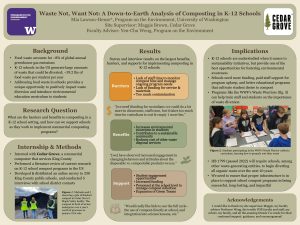WASTE NOT, WANT NOT: A DOWN-TO-EARTH ANALYSIS OF COMPOSTING PROGRAMS IN K-12 SCHOOLS
Globally, food waste contributes to roughly 8% of annual greenhouse gas emissions. Implementing a commercial composting program to address the issue of food waste in grade schools presents a unique opportunity to both divert food from the landfill and introduce environmental education topics to students. The aim of this study was to identify the benefits and barriers to composting in a K-12 setting in order to explore methods of supporting schools with commercial compost implementation. I began my research by conducting a literature review, and then created a survey and distributed it to over 300 K-12 schools in various districts across King County. I asked them to identify top barriers and benefits they faced, as well as supports to help them create a successful program. I found that lack of funding and staff time were some of the biggest barriers, and that an increase in environmental awareness amongst students was one of the biggest benefits. Schools reported that having student engagement opportunities and ensuring available funding were the most helpful supports for a successful program. By 2025, HB 1799 will require organic waste in Washington to be diverted from the landfill, meaning that schools will be compelled to compost. If systems of support are not set up before this blanket measure, composting programs will not achieve their highest possible success. I hope that by beginning to identify barriers to commercial composting, we will be one step closer in providing them the support they need to start diverting their food waste.
